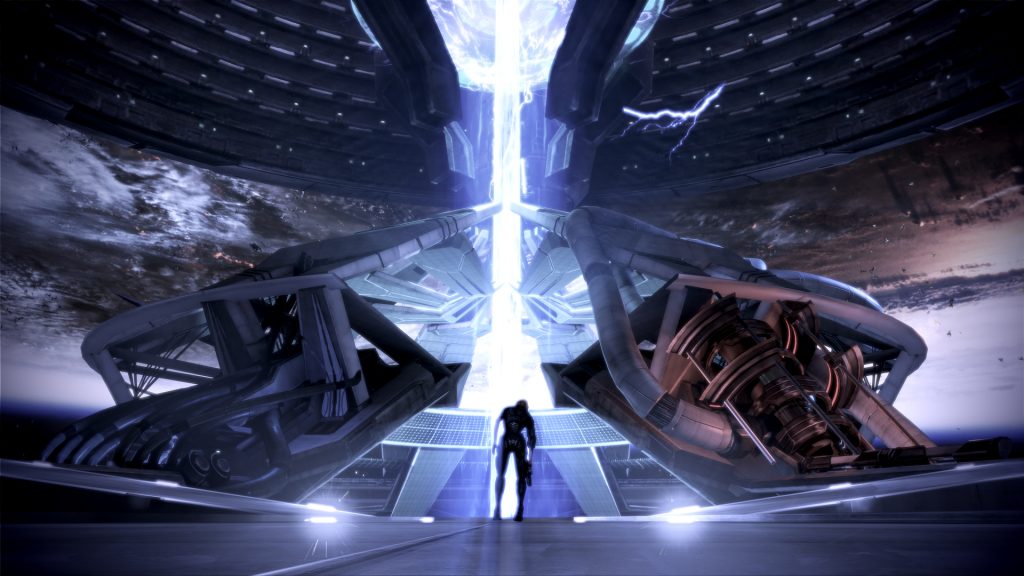“That’s it?”: What Happens When a Game Ends the Wrong Way?

Mallory Dobry ’17 / Emertainment Monthly Staff Writer
Warning: This article is not spoiler free. Proceed with caution.
Imagine walking into GameStop, or maybe more realistically in this day and age, Steam, the Playstation Network, or other digital outlets, and finding a game with a captivating trailer, great reviews, and the promise of a good time. Imagine playing the game for however many hours it lasts, getting to know your protagonist and the supporting characters, making choices with them along your adventure. And then imagine the game ending in a disappointing or heartbreaking fashion and crushing your soul a little bit.
Chances are, if you’ve played Mass Effect 3, it’s really not that hard to imagine, and the previous paragraph may just be rubbing salt in some wounds.
Contemporary video games have long surpassed the early days where the end goal was to reach the end of a level by hopping over obstacles or trying to shoot pixel spaceships to get a high score. Now, often video games have elaborate stories, intruiging and relatable characters, and a certain stickiness that brings players back time and time again. But because of this, controversy tends to arise whenever a game’s ending doesn’t quite stick the landing.
In 2012, when BioWare and EA released Mass Effect 3, the conclusion to the successful Mass Effect Trilogy, players were quick to voice their hatred of the games original ending, where Commander Shepard had to not only choose how to eliminate the Reaper threat, but face their own fate. After three games worth of making difficult choices, players felt as if BioWare owed them a better difficult choice to end the game.
The outcry was so dramatic that the company put out an Extended Cut ending, which offered more closure in the game’s ending for free.The Extended Cut DLC added an extra choice, lowered the score players needed to achieve better ending states, and additional content to close the story. Still, some players maintain a simmering animosity toward the ending. However, many did find it difficult to top the epic and climactic ending of Mass Effect and Mass Effect 2.
Similarly, CampoSanto’s Firewatch, which came out just this year found itself receiving criticism for the games “lackluster” ending. Firewatch follows the story of Henry, a man who takes a position as a fire watch lookout at Shoshone National Forest in Wyoming, as a means of escaping harsh reality of his wife suffering from Alzheimer’s. Equipped with just a map, a compass, and a handheld radio, Henry’s adventures seem trivial. He clears brushes, he wanders around, and he keeps his eyes peeled for forest fires, all while only communicating with Delilah, another lookout, only through his radio.
Henry’s relationship with Delilah continues to develop, and tensions begin to rise as something sinister lurks in the woods and a mystery unfolds before them. Firewatch turns the tables on the usual romanceable character mechanic, by making the player character the romance option.
At the game’s finale, a raging fire sweeps through the forest and calls for an evacuation. Henry must reach Delilah’s lookout in order to catch the rescue helicopter, and whether or not Henry tells Delilah to wait for him, she doesn’t. The two share a final conversation at her lookout, where Henry can decide to go visit his ailing wife or not, before climbing onto the helicopter (or not, it’s up to the player if Henry is rescued).
It’s not news that gamers are some of the most vocal fans around, sometimes for better or for worse. Because of this, it’s hard to create any facet of a game without meeting some criticism. Sometimes players believed that the writers owed them a better conclusion. But do they? And is there something positive to come out of controversial game endings?
In Bernard Suits’ book The Grasshopper, he says “playing a game is the voluntary attempt to overcome unnecessary obstacles”. Players spend hours creating characters, fighting enemies, and interacting with the world. Game developers and writers don’t just give players the opportunity to watch or read an adventure; they allow players to go on the adventure, to make choices, to be the leader of the story they choose. But ultimately, because of the story-heavy nature of many contemporary games, each individual playthrough is a little different.
Not all Jacks in Bioshock will have chosen to save the Little Sisters and not all Sole Survivors in Fallout 4 will choose to side with the same faction, just to name a few. Contemporary games have become so rich with story and character that it’s becoming harder and harder to detach from the games, and to process that perhaps they won’t always end the way they wish.
However, games with controversial endings do open up other opportunities for players. It allows them the chance to form their own conclusions and to engage with the games on a new level even after the credits roll. Players can theorize whether or not they think Commander Shepard survived the end of Mass Effect 3, or what happens to Ellie and Joel after he rescues her and lies to her in The Last of Us.
While controversial game endings may result in many tears and angry social media posts, it can also result in creativity and imagination that perhaps the writers and developers always intended or love to see. While games with generally well-received endings, like Journey or Portal, don’t kick up nearly as much dust, it’s important to note that often times, anger toward a disappointing ending doesn’t always come from a place of hatred. More often than not, it comes from a place of love. If players didn’t care about the game, they wouldn’t care if the ending bombed, which may in itself be a feat by developers and a test of a successful game.
P.S. Sorry Henry and Delilah never got to meet. It was kind of sad.
